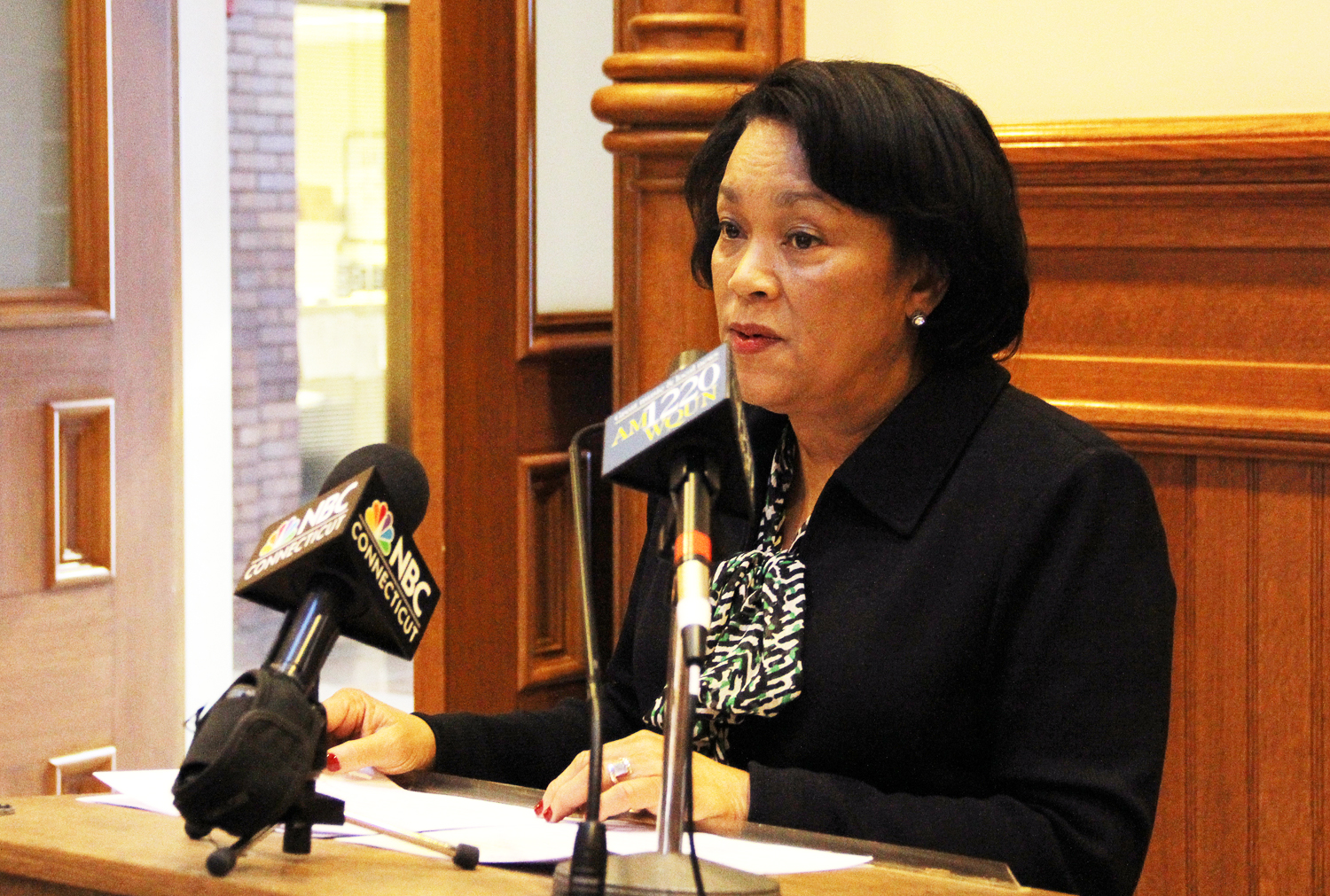
Mayor Toni Harp introduced her new budget proposal for the Elm City’s upcoming fiscal year at City Hall on Thursday.
By city charter, the mayor is required to submit her proposed budget to the Board of Alders by March 1 of each year. On Thursday, Harp and her staffers gathered in City Hall to outline the major points of the Fiscal Year 2020 Mayor’s Proposed Budget in advance of its official release. Harp’s financial vision for the next fiscal year allocates steady levels of funding to the city’s operations and sees the size of the general fund increase by just over 1 percent. As expected, the proposal does not increase the property tax rate or eliminate positions within City Hall. The proposal now goes to the Board of Alders, which will discuss and amend the budget before passing a final version.
“The Mayor’s Proposed Budget for FY20 calls for no mill rate increase, institutes savings through a creative, two-year capital budget plan — and through a city workforce innovation plan — and keeps pace with demanding, recommended contributions to the city’s two pension plans,” Harp said at the press conference. “This proposed budget anticipates no staff layoffs, maintains essential public safety, public education and social services programs, and preserves New Haven’s unique neighborhood improvement stipend for each district management team.”
In Harp’s budget proposal, the size of the city’s operating budget increases from $547.1 million for the current fiscal year to $556.6 million for the next fiscal year, which begins July 1. After legislators in Hartford designated less aid than expected last year, Harp instituted an unpopular 11 percent hike on the mill rate — the dollar amount paid for every $1,000 of assessed property value. The mill rate, after last summer’s increase, will remain at $42.98 for FY20.
The proposed budget also includes the cost of roughly 13 new city staffer positions. Mayoral spokesperson Laurence Grotheer told the News that the additional costs will be covered by an array of smaller increases in revenue across numerous sources, instead of any specific revenue generator.
Harp’s team crafted her budget based on the funding that Gov. Ned Lamont allocated to New Haven in his proposed state budget released last week. Money from Hartford accounts for about 40 percent of the Elm City’s total revenue stream, which Lamont plans to keep essentially steady over the upcoming two fiscal years.
Notably, Harp’s budget did not designate a significant bump to the school district’s funding. Education is the city’s largest expenditure, and Superintendent Carol Birks has asked for a $30 million increase to keep the New Haven Public Schools system afloat. Under the mayor’s proposed budget, the Board of Education will see a modest $750,000 increase.
Structurally, the budget also acknowledges the challenges in staffing that the city’s Fire and Police Departments have long struggled to contain. Fire and police overtime have reliably run over their allotted budgets as both departments are continually understaffed. Just past halfway through the current fiscal year, both fire and police have already exceeded their overtime budgets.
In acknowledgement of the Fire and Police Departments’ inability to fill their budgeted positions, Harp’s new proposal cuts down on budgeted positions for both departments. The Police Department will now have 429 positions instead of the previous 490, and the Fire Department’s budgeted roster will shrink by five. Neither of those decreases were reflective of structural changes in the staffing demands of their respective departments. Instead, Grotheer told the News that they were merely updates to reflect the Elm City’s recent realities.
Justin Elicker FES’10, SOM’10, who is challenging Harp for the city’s top office, told the News that he was dissatisfied with the budget’s “direction,” although he was unable to comment on specifics prior to the publishing of the official budget. He cited the expansion of government size and the continued reliance on borrowing as his two biggest concerns.
“Because Harp chose to refinance [last year]…these next two years will be easier,” Elicker told the News. “Future generations and future leaders will have to pay for it in about five years.”
In recent weeks and months, Harp’s top aides have emphasized that the city’s poor financial state is largely due to historical, structural issues stemming from previous administrations. They have touted a proposed five-year economic plan to address those issues. Previously, the mayor’s staff suggested that the plan would be unveiled along with this year’s budget.
The administration made no mention of the five-year plan at Thursday’s press conference and no indication of a Friday release. Grotheer told the News that the plan is “still in process” and is not currently ready for release.
The Board of Alders will now take up Harp’s proposals and has planned a number of forums in which to engage with public opinion. The first, a public hearing at City Hall, is planned for March 11 at 6 p.m.
The current fiscal year ends on June 30.
Angela Xiao | angela.xiao@yale.edu







